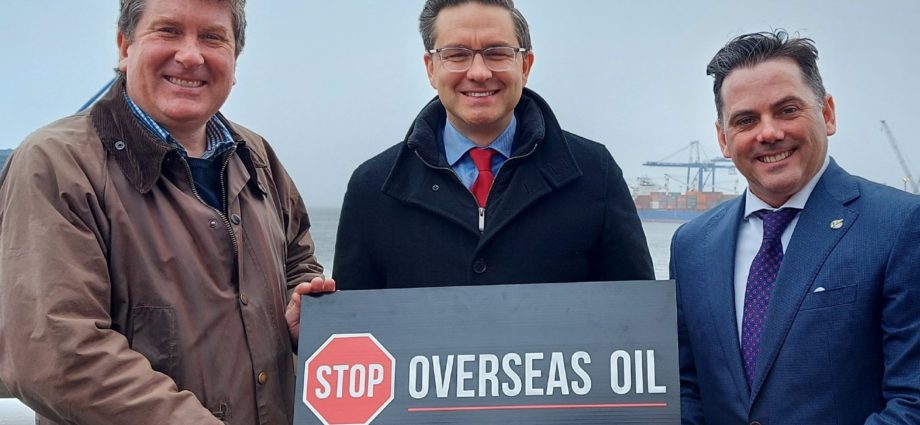
By Marlo Glass, Local Journalism Initiative Reporter, Telegraph-Journal
March 28, 2022
Federal Conservative leadership candidate Pierre Poilievre has pledged to cease imports of foreign oil and build more pipelines if he’s elected prime minister.
On Friday, Poilievre unveiled his three-point energy plan in Saint John – home of the Irving Oil Refinery and once the dream of the Energy East Pipeline – while on a tour of New Brunswick.
Poilievre said his plan will “stop dirty, overseas oil and replace it with clean, ethical, Canadian energy.” He pledged if named leader of the Conservative Party and then elected prime minister, his government would cease importing foreign oil within five years.
“You can’t be a truly free country if you don’t have energy independence,” he said.
In addition to banning overseas oil imports, Poilievre’s plan includes promoting oil and gas production projects, as well as opening up “new corridors” to transport energy across the country. He said his plan has no price tag because it simply supports existing projects.
Poilievre cited the proposed Bay du Nord oil project off the coast of Newfoundland. A floating production unit for storage and offshore offloading is proposed to access oil discoveries in the Flemish Pass Basin, about 500 kilometres northeast of St. John’s.
Federal Environment Minister Steven Guilbeault recently delayed the project. In a March 4 news release, the federal government said it needed more time to determine if the project would cause “significant adverse environmental effects.”
The project, Poilievre said, would increase the province’s oil production to 650 barrels per day.
While Poilievre said the best infrastructure option is a national pipeline, he said alternatives like increased rail lines and routes could help move oil from western Canada to refineries and markets on the east coast.
New Brunswick Premier Blaine Higgs has recently indicated a west-east pipeline project should be revisited, following Russia’s invasion of Ukraine.
“We have vulnerability in North America on energy supply purely through our own making,” Higgs said in a previous interview with the Telegraph-Journal.
“While none of us necessarily envisioned (Russia waging war on Ukraine) happening, the vulnerability of the world in Russia having such a huge supply of natural gas and oil, it’s unfathomable that we put ourselves in this position unnecessarily.”
Poilievre didn’t mince words Friday, saying “every time [Prime Minister Justin] Trudeau kills a pipeline, dictators like [Vladimir] Putin and [Nicolás] Mauduro do a dance.”
Canada ceased importing crude oil from Russia in 2019, according to data from the Canada Energy Regulator, but Statistics Canada data shows Canada imported $289 million in energy products from Russia in 2021.
“As long as we are using petroleum products, they should come from most ethical and environmentally responsible source, which is Canada,” Poilievre said, noting the country brought in 45 million barrels of oil in 2020.
Plans for the Energy East pipeline – which was expected to carry diluted bitumen from western Canada to New Brunswick and possibly Quebec for processing and shipping – were scrapped by TransCanada in 2017.
Canada, Poilievre said, has higher environmental standards for producing oil, with carbon capture and storage technology being “exported around the world.”
While Poilievre acknowledged the country should also focus on reducing greenhouse gas emissions, he said Canada will “continue to consume millions of barrels of oil per day,” regardless of who leads the country.
“The answer is not to shut down energy sector but to make it cleaner and more efficient,” he said, “to capture carbon, put it back in the ground where it came from, and use exclusively Canadian projects.”
Sign Up for Our Newsletter.
Poilievre was also expected to make stops in Fredericton and Miramichi on Friday.
– With files from Emma McPhee and Adam Huras



